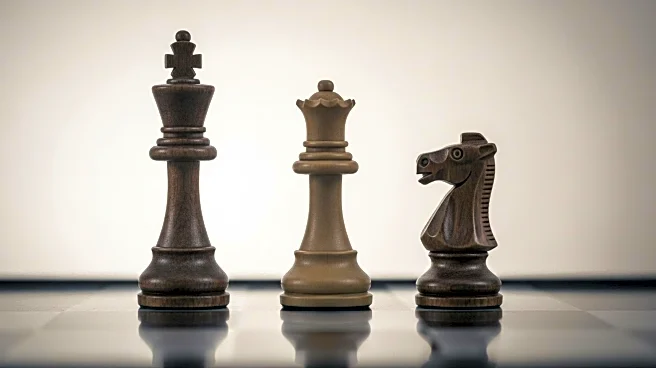What's Happening?
During a military parade in Beijing, China's President Xi Jinping, Russia's President Vladimir Putin, and North Korea's leader Kim Jong Un met publicly for the first time, marking 80 years since Japan's defeat in World War II. The event featured China's military advancements, including hypersonic missiles and underwater drones. President Trump suggested on Truth Social that the leaders were conspiring against the U.S., a claim dismissed by Kremlin aide Yuri Ushakov as ironic. Xi's speech emphasized China's growing military and diplomatic influence as an alternative to a U.S.-led world, highlighting choices between peace and war, dialogue and confrontation.
Why It's Important?
The public meeting of Xi, Putin, and Kim signifies potential shifts in global power dynamics, challenging U.S. influence. Xi's emphasis on China's military and diplomatic clout suggests a strategic pivot towards establishing a new world order. This development could strain U.S. relations with allies and rivals, impacting international diplomacy and security. The parade's military showcase underscores China's ambitions, raising concerns about regional stability and the balance of power. The U.S. may need to reassess its foreign policy strategies to address these emerging challenges.
What's Next?
The U.S. and its allies are likely to closely monitor the interactions among Xi, Putin, and Kim, particularly any developments in military cooperation. Diplomatic efforts may intensify to counterbalance China's growing influence and address potential threats to regional stability. The parade's emphasis on military power could lead to increased geopolitical tensions, prompting strategic responses from the U.S. and its partners. Analysts will be watching for any shifts in alliances or policy changes that could impact global security and economic dynamics.
Beyond the Headlines
The event raises questions about the ethical implications of military power in shaping global politics. Xi's vision of an alternative world order challenges traditional Western-led norms, potentially leading to a new era of geopolitical competition. The parade's focus on military advancements reflects broader cultural narratives of strength and dominance, influencing perceptions of China's role in the world.











